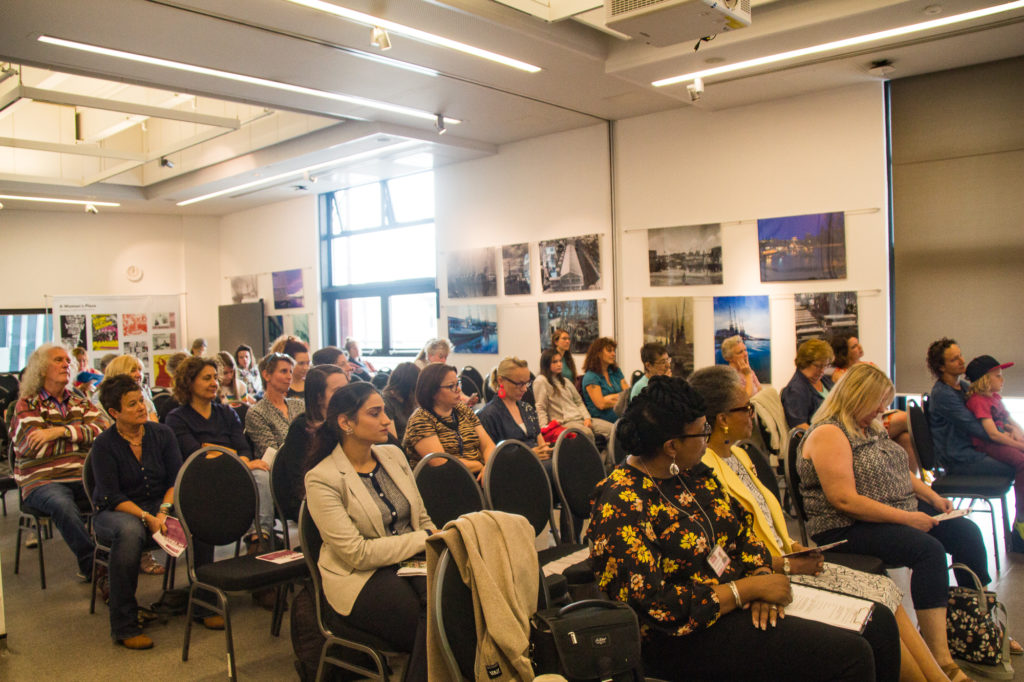Community Reporter – Laura Hillier
On 31st August, Bristol Women’s Voice hosted an event in partnership with the M Shed which sought to highlight the role of women in the trades and construction industries. This event is particularly timely and relevant, given the large amount of Bristol’s investment in construction and the potential career opportunities that could be provided for women.
As part of the event’s programme, there was a panel discussion about the political and economic barriers faced by women regarding working in the trades, and how these can be overcome. The panel members included: Karin Smyth (Labour MP for Bristol South); Fadiya Ahmed (Senior Project Manager at Whitehead Allen and general committee member of Women in Property South West); Pepper Barney (architect, urban designer and director of BiBO); and Tracey Blythe (Senior Trade Union Rep for Unite at Airbus and Unite National Executive Council member for South West). The discussion was chaired by Jackie Longworth (chair of the Women’s Equality Network, Fair Play South West).
It is clear that women working in the trades and construction face discrimination and barriers when trying to enter the fields and subsequently, throughout their careers. In architecture, for instance, Pepper Barney explained that whilst the gender balance is approximately 50/50 at undergraduate degree level, the proportion of women decreases at each step upwards in the field. Our panel members also shared several examples from their personal experiences which illustrated the discrimination that women can face. These included being discouraged from participating in a male-dominated course since a woman’s presence would be “distracting to the boys”, being repeatedly turned down for apprenticeship interviews, and finding on site that there were no available boots suited to women’s feet. Whilst hearing about these unpleasant experiences was infuriating, the panel members’ commitment to succeed despite facing these barriers was inspiring. Suggestions were made about ways to help women to cope with discriminatory experiences, such as workshops which provide training to women on overcoming these situations.
The panel also considered the effect of gender stereotyping on boys and girls, since the conditioning we experience from a very young age has an influence throughout our lives. This can occur in all aspects of a child’s environment – including the home, school, peer groups and wider society (e.g. the media) – and results in expectations about what girls “should” or “shouldn’t” strive towards as a career. Little girls are often treated very differently to little boys, with an example of this provided by Pepper Barney – little girls are more often simply given something, whereas there is stronger encouragement towards a little boy’s self-sufficiency. This can have a significant impact over time, and can contribute towards a girl’s sense of not being able to do certain things for herself. Our panel members expressed that the education system in its current form may be letting us down in this regard, as it may be too late to counteract this conditioning by the time that children reach secondary school. The visibility of women working in the trades and construction is critical, as this can show young girls that these careers can be open to them. As Karin Smyth highlighted, BWV’s Women in Trade event showcased “the role models of the past, the role models of today and the role models of the future”.
The panel also discussed the role of apprenticeships for encouraging women into trades and construction careers. Karin Smyth spoke about the work she does around apprenticeships, which are particularly important for young people in her south Bristol constituency. Karin also noted a positive development, as south Bristol will soon be getting a new construction skills centre based in Hengrove. This training centre could be hugely beneficial for providing careers opportunities in the trades for women, especially given the in-demand nature of construction work in Bristol.

The panel members shared ideas about additional strategies which could reduce barriers faced by women when seeking to obtain (and maintain) employment in the trades and construction. Fadiya Ahmed spoke about initiatives which tackle the unconscious biases held by employers about women and men – for example, removing names from CVs can make it more likely that employers only consider skills and qualifications when hiring. Lisa Stone suggested that positive discrimination and government initiatives to increase the number of women in these roles would be beneficial, and Jackie Longworth pointed out that there is the possibility to use positive action (e.g. additional support from employers in the workplace) to support women to overcome barriers under current UK legislation. Furthermore, an increase in flexibility regarding working patterns may be particularly important for women, who still contribute the majority of caring labour in the UK. Tracey Blythe also advocated for a severe reduction in the tolerance of insecure work, since insecure work is much more likely to block women from entering the trades and construction if they have caring responsibilities.
From listening to this panel discussion, it’s obvious that further change is required to make it easier for women to enter the trades or a construction career in the first place. A critical priority should also be making the workplace a safer and more respectful environment, as well as more able to accommodate the specific needs of women so that they can remain and progress in the field. The discussions between our panel and audience members were passionate and lively, and it seems that there are initiatives underway to improve prospects of a career in the trades and construction for women. While there is clearly much more work to be done, I do feel cautiously optimistic that society is at least headed in the right direction.

